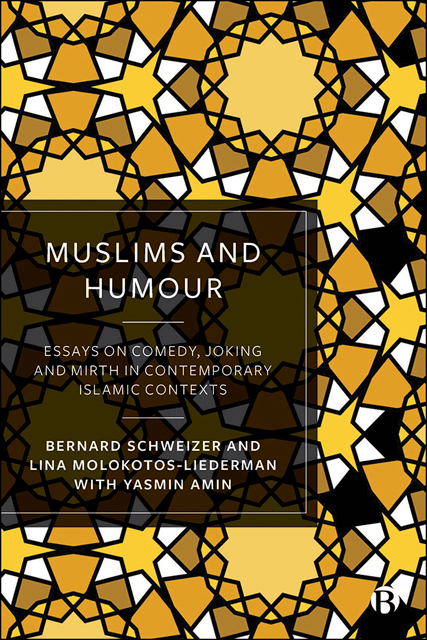Book contents
- Frontmatter
- Contents
- Notes on Contributors
- Acknowledgements
- Introduction
- Part I Theoretical Perspectives on Islam and Humour
- Part II Muslim Humour Practices in Islamicate Societies: Textual Media
- Part III Muslim Humour Practices in Islamicate Societies: Visual Media and Performance
- Part IV Muslim Comedy in North America
- Conclusion
- Bibliography on Islam and Humour
- Index
2 - Laughter in the Discursive Tradition? Emotions of Muḥammad as the Topic of a Pious Arabic– English Reader
Published online by Cambridge University Press: 13 October 2022
- Frontmatter
- Contents
- Notes on Contributors
- Acknowledgements
- Introduction
- Part I Theoretical Perspectives on Islam and Humour
- Part II Muslim Humour Practices in Islamicate Societies: Textual Media
- Part III Muslim Humour Practices in Islamicate Societies: Visual Media and Performance
- Part IV Muslim Comedy in North America
- Conclusion
- Bibliography on Islam and Humour
- Index
Summary
Introduction
This contribution presents a fascinating product of Arabic-Islamic scholarly traditions, namely a bilingual Arabic– English anthology of the ḥadīths (sayings and deeds) of Muḥammad, focusing exclusively on contexts in which the Prophet of Islam is depicted as laughing. The anthology, originally compiled and published in Arabic by the contemporary scholar Muḥammad ʿAlī ʿUthmān (Āl) Mujāhid, was republished in a bilingual version by the Egyptian publisher Dār al-Manāra in 2009 under the title This Beloved [PBUH] Smiling. Situated at the intersection of Arabic-Islamic scholarly traditions and strategies aimed at the dissemination and propagation of Islamic knowledge, this anthology suggests an emic perspective on how the bodily laughter of Muḥammad may be foregrounded, notwithstanding the prophetic gravitas widely expected from the founder of a contemporary world religion.
To adequately engage with this text, this chapter begins with a brief overview of the different modes in which academic research has engaged with the field of humour and laughter in Muslim scholarly traditions. This is supplemented by a theoretically oriented survey of negotiations of proper conduct in (contemporary) Muslim societies, as well as a reconstruction of the specific positionality of (Āl) Mujāhid as a contemporary Islamic scholar and editor of thematically focused anthologies of ḥadīth. Building on this background, later sections will inductively reconstruct the epistemic and moral dimensions of the laughter depicted in the ḥadīths included in this compilation. The chapter concludes by analyzing the triple prefaces of the bilingual edition presented by the author, translator, and publisher.
Framing humour and laughter in Muslim scholarly Traditions
In two programmatic articles, Mir (1991: 187, cf. Mir, 2000) suggests that a comical dimension existed in the Qurʾānic text and that irony, seen by him as ‘the principal device’ of this comical dimension, formed a pervasive feature of the sūrat Yūsuf, the twelfth sūra of the Qurʾān. While agreeing that humour does indeed appear in the Qurʾān, Tamer (2009a: 5) proposes a different understanding of two of Mir's most prominent examples, stating that ‘[b] oth stories lack any sense of humour or irony’.
- Type
- Chapter
- Information
- Muslims and HumourEssays on Comedy, Joking, and Mirth in Contemporary Islamic Contexts, pp. 44 - 69Publisher: Bristol University PressPrint publication year: 2022



